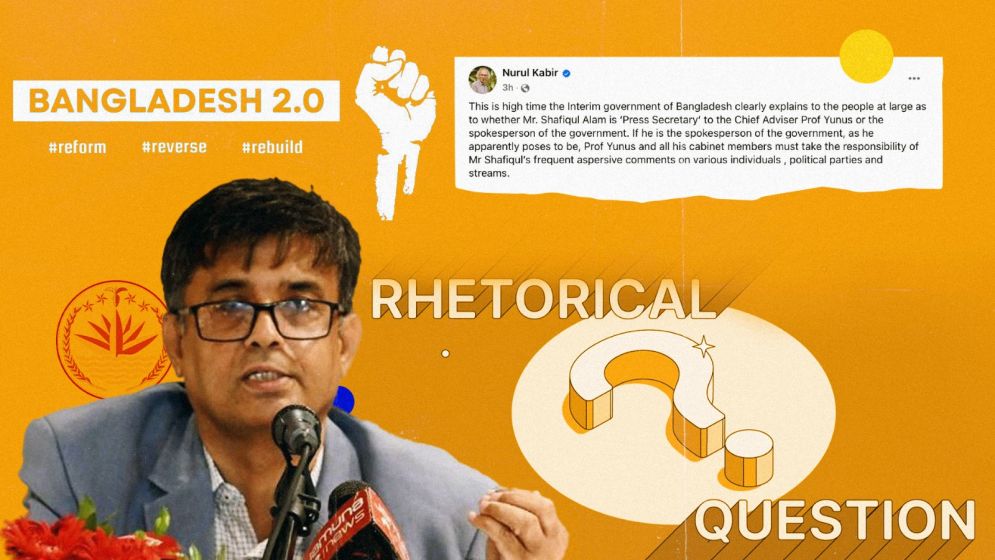Nurul Kabir on Shafiqul Alam's role: What’s the real rhetoric behind the rhetorical question?

By any measure, Nurul Kabir is not just another editor with a Facebook account. He is a doyen of Bangladesh’s press–venerated, unflinching, and one of the last few who dare to speak plainly in an era of ambiguity.
So when he asks a question, it demands an answer.
Early Wednesday morning, Nurul Kabir posed one such question on his verified Facebook page: Is Shafiqul Alam the ‘Press Secretary’ to the Chief Adviser Professor Muhammad Yunus–or is he the official spokesperson of the interim government itself?
If Shafiqul is, in fact, the latter–as he increasingly appears to present himself–Nurul Kabir insists that Dr Yunus and his cabinet must answer for the increasingly “aspersive comments” Shafiqul has been making about various political actors.
In Nurul Kabir’s view, which many quietly share, such unchecked commentary coming from the government’s communications nerve center is not only irresponsible–it’s corrosive.
The question is not trivial. In Bangladesh, the role of the Press Secretary to the head of government is one of the most coveted roles among the journalistic circle. Traditionally, it is handed to a senior journalist–one who either quietly supports or openly affiliates with the ruling regime.
Under previous administrations–especially the authoritarian years of Sheikh Hasina’s rule–the Press Secretary operated in the shadows. Most citizens couldn't name them, but those in the know understood their reach.
They wielded disproportionate power, often orchestrating media strategy [of imposing censorship], managing elite patronage, and, in more than a few documented cases, overseeing lucrative contracts and syndicates.
Even deputy press secretaries were allegedly involved in multimillion-dollar deals, their influence quietly radiating from the Prime Minister’s Office like secondhand smoke.
Into this power matrix entered Shafiqul–a seasoned journalist, former AFP bureau chief in Dhaka. In theory, he was meant to play a familiar role: the restrained, bureaucratic voice of the Chief Adviser. A professional behind the podium. Measured. Predictable.
But that script never meant to work after a revolutionary-scale uprising.

Streamlining PR
amid the noise
Over the past nine months, the 55-year-old former journalist has essentially torn up the traditional playbook. Instead of functioning as a neutral conduit between the interim government and the press, Shafiqul has emerged as a political protagonist in his own right–blunt, combative, and increasingly controversial.
His most incendiary moment came recently on a live talk show, where he declared that the interim government had the “mandate to do everything,” placing virtually all authority under the vague banner of “reform.”
The fallout was swift. Critics accused him of overreach. Some allies privately described him as impatient, dismissive, and addicted to the spotlight. Even those within his professional orbit are raising concerns about his temperament and judgment.
And yet, amid the backlash, a more complex reality is being missed.
While Shafiqul’s tone and political theatrics have become lightning rods, few acknowledge the transformation he and his press team have brought to the government’s communication machinery.
For the first time in Bangladesh’s history, the public can directly question senior officials at regular press briefings–open to both journalists and ordinary citizens–held multiple times a week at the Foreign Service Academy.
Ministers and advisers routinely appear. The information flow is more disciplined, more accessible, and far more coherent than anything seen under the chaotic post-uprising environment or the previous regime’s opaque press strategy.
Shafiqul’s Press Wing has also begun engaging on prime-time talk shows, facing hostile questions in unscripted formats–a significant break from the past, when officials largely avoided open forums or relied on sanitized government bulletins.
So, yes–Shafiqul Alam has become the most talked-about Press Secretary in the country’s history. But the conversation remains shallow if it only centers on his missteps.

Rhetorical and
a no-brainer question
Another important fact is, after six months, hundreds of street protests, and a relentless storm of criticism over governance, one thing is clear: the interim government’s Press Wing has accomplished what few expected.
It has imposed coherence–if not consensus–on the messaging chaos that followed the fall of the previous regime.
In earlier times after the uprising, the public was justifiably frustrated by contradictory statements from interim officials. Confusion reigned. Today, however, communication has become streamlined, disciplined, and unusually transparent.
So at first glance, it seems that Nurul Kabir asked a fair question. Upon closer inspection, it’s not only rhetorical–it’s beside the point.
The interim government, as many now have started to say, exists not on the back of party machinery or institutional depth, but on the singular reputational authority of Dr. Muhammad Yunus. His credibility is the administration’s operating license.
So naturally, the man who speaks for Yunus also speaks, by extension, for the entire government. To pretend otherwise is to ignore the reality of how this administration is structured–and perceived.
Besides, Bangladesh has rarely institutionalized the role of a government spokesperson. Not even the Ministry of Foreign Affairs, where clarity in communication should be paramount, has managed to establish such a role in any meaningful sense.
The idea that a press secretary could speak for both a head of government and the apparatus around him is not essentially a contradiction–it’s the norm, dressed in new clothes.
Nurul Kabir’s question, then, isn’t really a demand for clarification. It’s a provocation.
And perhaps that’s the point. In an atmosphere, where the line between bureaucrat and political actor remains dangerously blurred, calling attention to that tension is, in itself, an act of accountability.
But let’s not pretend we don’t already know the answer. Shafiqul Alam speaks for the interim government because he speaks for Yunus. And in today’s Bangladesh, that’s one and the same.
—-
Harun Ur Rashid is a writer and commentator

